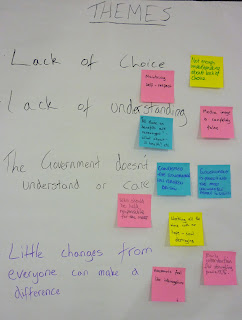One of our Commissioners shares their experience of the Bedroom Tax…
I am a disabled lady who suffers from chronic Crohn’s Disease, osteoarthritis ad depression. I currently live in a 3 bedroom, 2 bathroom, flat with my partner and daughter.
Due to the nature of my illness, 2-4 nights a week I need to sleep in my spare room (my mattress and bedding needs to be stripped off and washed due to sickness and diarrhoea) as my bed’s mattress is wet. I also need to use the bathroom at least 4-6 times a day, sometimes up to an hour at a time, or as often as every fifteen minutes. With having two bathrooms it makes life easier (for my family members).
I contacted Money Maters in March this year and they filled in a DHP (Discretionary Housing Payments) form for me and also an “Additional Bedroom Allowance” form. I enclosed a letter from my doctor saying I needed a 2 bathroom house and my extra bedroom. I had previously told GHA I was willing to downsides to a 2 bed, 2 bathroom house (and I could put a spare bed in my daughters room) but they said they did not have any 2 bed, 2 bathroom homes.
I felt I was being penalised due to my illness, and the council having no alternative accommodation to suit my needs, by having to pay £40.16 monthly bedroom tax. That might not sound like a lot of money to most people, but when it has to be found out of an already stretched benefit income it is a lot. I paid my first £40.16 out of Aprils ESA payment. I took the money out of my “food allowance” budget, and for the 3 days before my next fortnightly payment of ESA was due, I lived on toast so the rest of my family could eat properly. If I don’t receive DHP, I will have to do this every month.
The worry, and stress of finding this extra money, has had a huge impact on my health condition and stress levels. I feel I am fighting a losing battle just to “survive on benefits”.
Monday, 29 April 2013
Tuesday, 9 April 2013
You want a word for poverty – it’s relentless.
On Friday 22nd March 2013 the second in a series of six Poverty Truth Conversations took place at Gorbals Parish Church. The Conversations bring together key decision makers and public figures with those who have direct experience of social and economic deprivation, driven by belief “Nothing about Us without Us is for US”.
The event began with a welcome and continued with everyone invited to share their name, what they had for breakfast and where they would ideally spend the weekend. This allowed everyone to get to know a little more about one another in an informal manner where all could participate (in keeping with the goal of breaking down the formal character often prevalent in meetings).
After introductions, a selection of photographs was presented and everyone selected an image reminding them of part of their life story. Everyone mingled; explaining the significance of the photograph they had chosen.
Following sharing the photographs, everyone read a section from a harrowing life story telling of a mother struggling to make ends meet in the midst of relentless hardship. The story touched upon childhood abuse, violence, ill health, courage, determination and resilience; a very moving account where many shed a tear listening to the emotional life story. A prominent theme emerging from the story, and subsequent discussion, was the need to avoid categorising poverty under one or two headings. Instead, emphasising the real need that poverty be understood as a multi-dimensional reality.
Those at the Conversation reflected on the life story in small groups and discussed their own experiences of poverty. Several people talked of professional services, designed to help society, treating service users in a sub-human manner. People expressed feeling like a number, not an individual. The soul destroying nature of poverty and lack of understanding by the media was raised through discussion.
The Conversation was brought to a close by seeking responses to the life story and, more generally, of experiences living in poverty. Issues raised included politicians avoidance of discussing poverty with some positive suggestions being put forward including viewing poverty as an issue which all in society can play a part to resolve.
For further reflections on the second Conversation, please take a look at this Third Force News article by Martin Johnstone:http://www.thirdforcenews.org.uk/2013/03/nothing-about-us-without-us-is-for-us/
The Poverty Truth Commission would like to thank all who attended and contributed to the event. The PTC is very much looking forward to the next Conversation which will be held on Friday 31st May.
Labels:
Conversation,
Poverty Truth Commission
Subscribe to:
Comments (Atom)
